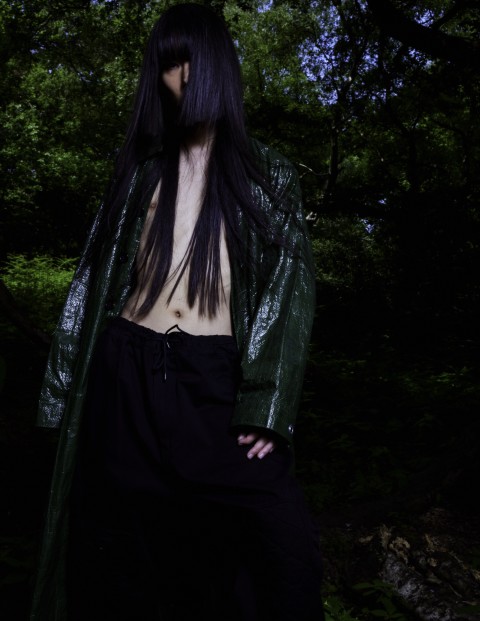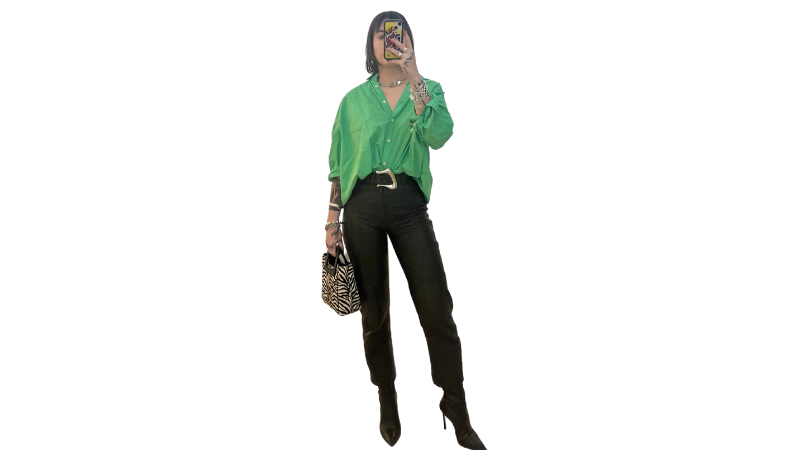Exploring Asian Identity in London With LU’U DAN and Bo Ningen
Founder of LU’U DAN Hung La sits down with the members of the Japanese-born, London-founded rock band Bo Ningen.

Some years ago, Hung La made London his home. It’s the city he founded his label LU’U DAN in, and it’s a city that he readily admits he couldn’t get a handle on at first. “I don’t understand British people,” he recalls thinking. “The conversation about Asian identity is very different here,” he says. That conversation is one La wants to have wherever he sets foot, and so he decided to sit down with Bo Ningen, a rock band of four Japanese musicians that formed in London.
The latest LU’U DAN collection is called Black Emperor, a reference to the cult documentary , a 1976 chronicle of a Japanese biker gang. According to La, it’s a collection about “loyalty, pride, and gang culture.” In Japan, the motorcycle crews were known as bōsōzoku, and they’re a symbol for boisterous defiance. Audacious rebellion is a tenet of the LU’U DAN label, and as part of the exploration of bōsōzoku, La held a conversation with Yuki Tsujii and Taigen Kawabe, of Bo Ningen. The members of the band constituted a sort of rebellion against the reigning codes of rock music in London. The prototypical UK rock band was not singing in Japanese, for one.This is the latest installment of the LU’U DAN city tour project, which explores identity and the Asian diaspora around the world.

How do you describe the band?How did growing up in Japan influence your identities? How did your collective energies come together to create Bo Ningen?
Taigen Kawabe: We used to be a bit more fussy about how people categorized us. They used to refer to us as psychedelic, noise, or acid punk but since 2007, we’ve seen that change.Yuki Tsujii: Ultimately, we’re a simple rock band with a simple setup. We got guitars, we got drums, we got a bass player singing, and one of the guitar players plays the synth. It’s a rock band in the form of a rock band. What you hear is what you hear. When I introduce Bo Ningen, I describe us as, “Four Japanese guys, long hair, doing crazy shit on stage.” We play rock music—that’s it.Yuki Tsujii: Kohhei and Monchan aren’t with us on this call but we all met in London but came from different parts of Japan and had different upbringings. I’m from the Kansai area near Osaka, the third largest city in Japan. Their people are known to be friendly and down to earth but some are known for being rough. I grew up in a relatively normal family, except one of my brothers was quite wild and used to be in a biker gang. He would come home while I was sleeping and I would wake up to the loud noises of him showering, fighting with my father, or the sound of their customized engines. I remember crying a lot because it was pretty terrifying but all of his friends were nice to me and looked after me. They still have a big impact on me visually because they all had crazy, fully customized, embroidered looks called Tokkofuku. I think they’re amazing now but looking back, I was terrified of them. This all played a big part in creating my identity and my brother was the first sort of masculine character in my life.

It’s bosozoku culture, which was motorcycle gang culture in Japan in the 70s and 80s, predominantly. What did you see those kids? Was it rebellion? Was it strength? They had this fierce pride, this loyalty and these flags. It was a nationalistic rebellion against the powers that be with a very punk rock spirit.From day one, you guys were on the moodboard for LU’U DAN. Your identity spoke so loudly to me and another person who occupies this space that you’ve toured with is Damo Suzuki. How was he influential in your music as a role model and reference?
Yuki Tsujii: In my brother’s case, it probably wasn’t as epic as you mentioned, moreso he was just unhappy with his life, his schooling, and our family. I couldn’t ask him about it then because I was just a kid. I couldn’t have a brotherly relationship with him until quite recently and it’s definitely propelled me and empowered me on stage now.Taigen Kawabe: I grew up in a place called Shibuya and went to school an hour away from where I lived so I didn’t really have local friends. When people think of Tokyo and gang culture, they think of Shibuya, Shinjuku, and Ikebukuro, which are the three places that were famous for it in the 80s and 90s. For two or three years, I lived in the same building as a Yakuza office. I could hear the shouts of them trying to get money from other people. Even though I didn’t relate to any gang culture, I could see both the dark sides and the really bright sides of Tokyo. People came to my school from all over Tokyo so I could see different sides of the city throughout my childhood. Another big thing I remember as a kid was the illegal, porn flypostings in the late 80s and 90s, we called them pink flyers. I think they’re banned and almost non-existent anymore but I used to pick them up and ended up with this collection of weird porn. My mom found it and laughed at me and at the time she was buying me a manga called Buddha by Tezuka Osamu—maybe she wanted me to delete my earthly desires. Another memory I had was of the cult religious group Aum Shinrikyo. They did a huge terrorism attack. I grew up really close to one of their main offices. My parents had a couple of friends who were in it and they would preach in front of the Shibuya station with really psychedelic outfits. Shibuya was really chaotic and all of this chaos really affected my taste in music and sound.Taigen Kawabe: In Austria, on our latest tour, we were talking about Asian stereotypes and stereotypes of Japanese people who lived outside of Japan, especially in Europe. We thought about how Damo Suzuki is the epitome of a Japanese guy who has lived outside of Japan for a long time, especially with his long hair.Yuki Tsujii: He definitely created that.Taigen Kawabe: Yeah, it’s like an image for European people of what it means to be Japanese.Yuki Tsujii: We didn’t know Damo then, we only knew of him in the last 10, 15 years. Damo san is musically very inspiring. Even since the 70s, his style hasn’t changed. He carried a backpack with only his underwear and T-shirts. Today, he doesn’t he doesn’t play instruments, he just travels and collaborates with local musicians and artists. He’s a legend, he’s got just such a free soul and such a powerful aura. He’s a big senpai for us as both a musician and also simply as a person too. Every time we’re hanging out with him, he’s smiling, telling great stories and I always try to ask him about recording an album but he never listens to me.Taigen Kawabe: He doesn’t believe in the magic of the recording studio anymore and hasn’t made a studio album in more than 30 years. He believes in the magic of what is happening in real time, both for the audience and the artist. We believe in the same magic but also that it exists in the production process, including in the studio as well.


Do you think there’s enough representation of Asian masculinity? Do you feel represented?I want to talk about feeling like an outsider in Japan. I’ve been in Europe for 20 something years and I’m not American, I’m not Vietnamese—I have floating origins at this point and I think it’s fascinating to understand what makes us feel at .
Yuki Tsujii: It’s quite interesting because how we felt when we started back in 2007 or 2008 to how we think about our identity now is pretty different. When we started playing a lot of shows in East London, when we were completely no one, we did an interview with this magazine called . It’s a free paper that you can find anywhere in pubs and venues, and someone drew a dick on our faces and said we couldn’t sing or play for shit. People would be booing or throwing water bottles and cans at us, saying to fuck off because we were Asian. I felt quite shocked, but felt this force which turned me on. Instead of thinking it was horrible—even though it was—I began to think about how we were representing ourselves. When they saw us they didn’t think we [fit in]; we weren’t tall enough and we spoke a different language. We started creating our own identity without knowing entirely what it was. After those 10 or 15 years of living in London, calling it home, having friends and settling in, we essentially became Londoners. Our identity now as a band or individually has been divided into two parts, one is all this rage from 2009, and the other is a bit contradictory because we’ve become completely blended into this culture almost comfortably. I feel less and less Japanese.Taigen Kawabe: I think London was and maybe still is a bit behind when it comes to having an idea of what it was to be Japanese. Yet this provided inspiration for us because it gave us insight into the counterculture. London was home to so many legendary rock bands but I was really disappointed when I landed in London in 2004. They were calling music “indie rock” and I was against it because it was supposed to mean being independent, in opposition to mainstream culture, but this kind of music had no energy and had more of a fashion kind of vibe. People could look punk but they weren’t independent to me at all. When we formed Bo Ningen, that was one of the reasons why we sought out this kind of riotous feeling, out of anger and frustration. When you start something there are naturally feelings of frustration or a desire to create a kind of explosion.Yuki Tsujii: In the last few years, I’ve started to feel more like an outsider in Japan. I’ve got family still there, I’ve only got Japanese citizenship, I go back once a year, I love Japanese food—it’s the best food in the world—I love Japanese music; so yeah, it’s definitely comfortable being there. But I haven’t been involved in any activities, movements, and scenes there. I’ve been staying away from it, not intentionally, but sometimes I feel weird about being there. I still miss my family and it’s always a great time but if I stay there for a long time, I start to suffocate a bit.

It sounds like you like to be an outsider.
Yuki Tsujii: Maybe? Maybe because I don’t belong there, I don’t live there, not in the system, not registered in the social security. Basically I don’t exist there.



